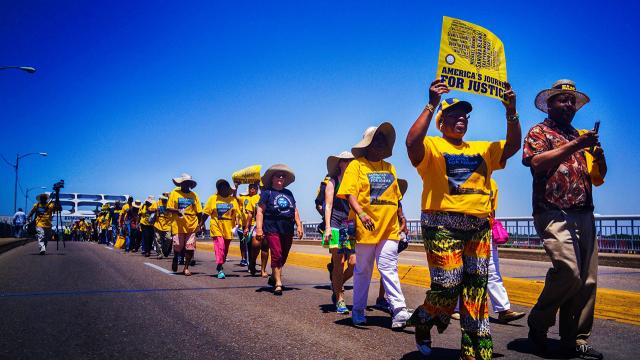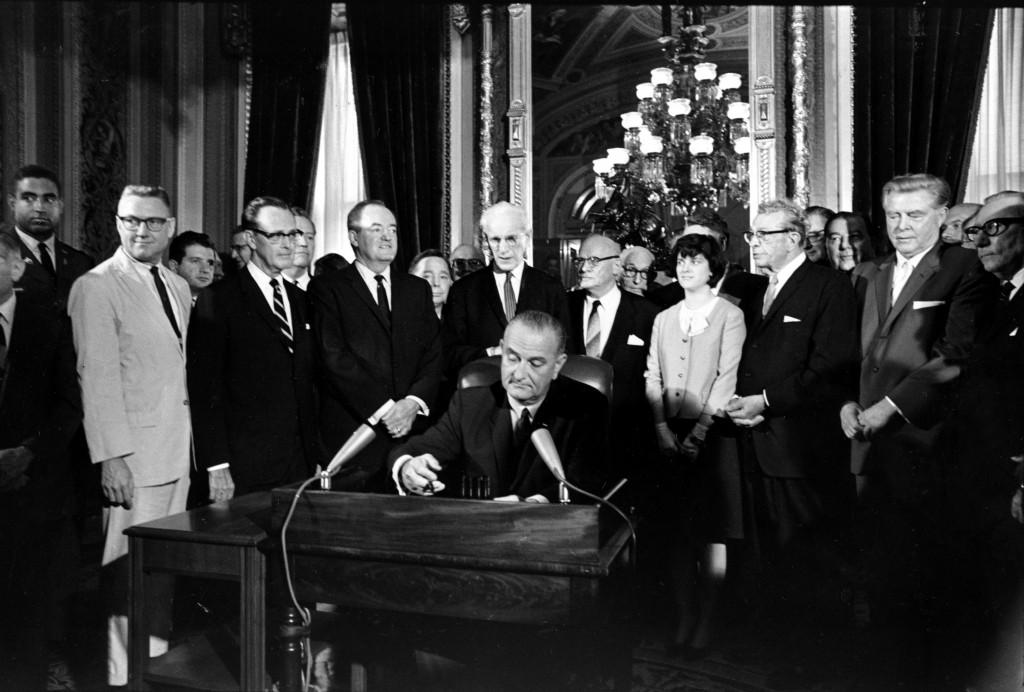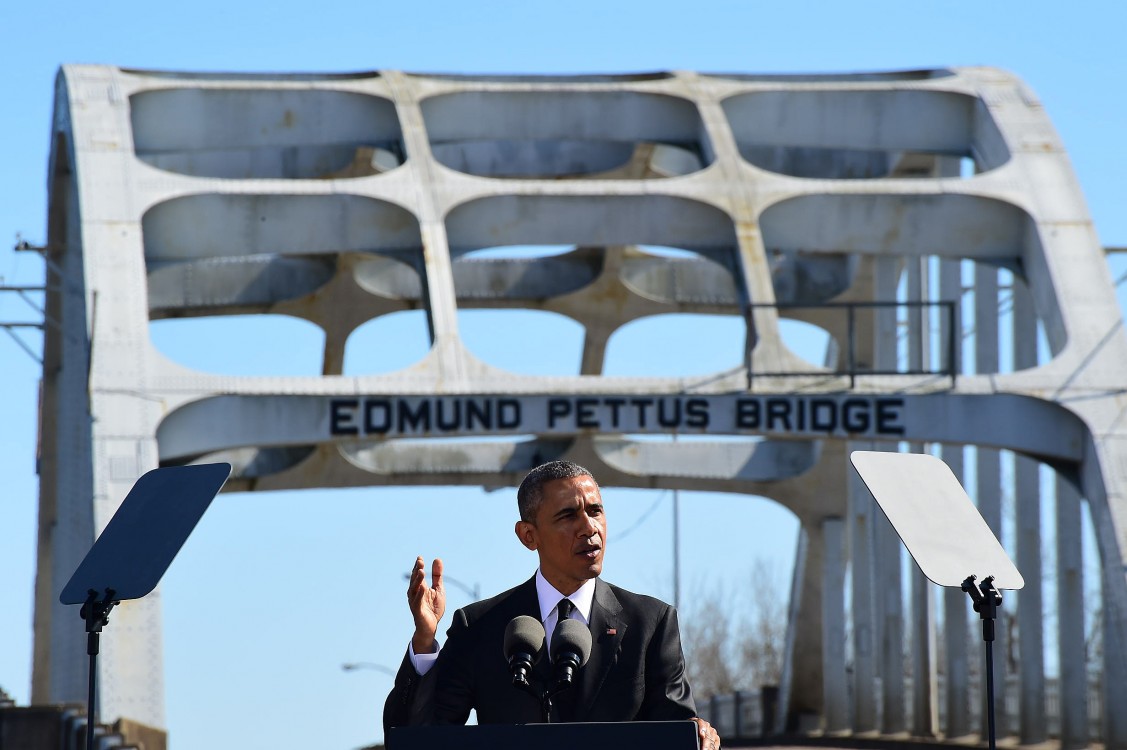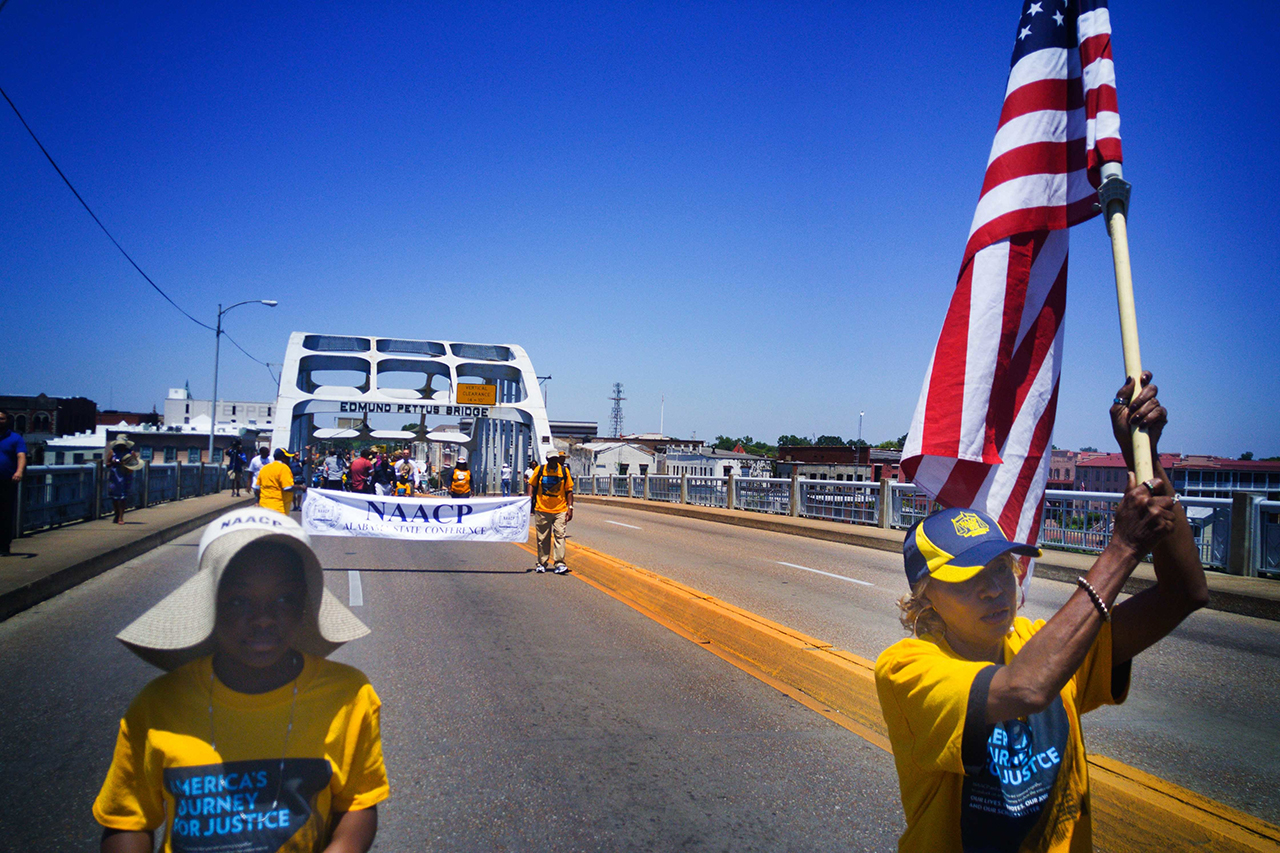
Clad in yellow shirts, hundreds of marchers streamed across the Arlington Memorial Bridge on September 15, and ended their nearly 1,000-mile "Journey for Justice" march at the steps of the Lincoln Memorial.
Many of those marchers set out six weeks ago to retrace the historic "Bloody Sunday" civil rights march from Selma to Montgomery, Alabama, in 1965, which was instrumental to the passage of the landmark Voting Rights Act (VRA) that year. More than 50 years later, activists have taken their own civil rights march even farther than Montgomery – to the halls of Congress, to demand that legislators pass the Voting Rights Advancement Act (VRAA) and press for the advancement of a broader racial justice agenda around education, income inequality and reforms to the criminal legal system.
The VRAA, introduced this year, would restore a key provision of the VRA that was struck down by the Supreme Court two years ago in its 2013 Shelby County v. Holder decision. In that decision, the court tossed out a formula under Section 4 of the VRA that required federal approval, or preclearance, for changes to voting procedures in states with a history of voting discrimination.
The ruling paved the way for predominantly Republican-controlled state legislatures to move forward with congressional redistricting and voter identification laws that have been found to disproportionately suppress the vote of marginalized groups more likely to support Democratic and liberal-leaning third-party candidates.
"We know from our history that no matter how many times we make forward steps, there will always be someone out there looking to move us back," said Rep. Jim Clyburn (D-South Carolina) on the steps of the Lincoln Memorial during a September 15 press conference. Clyburn is the third-ranking House Democrat and a prominent member of the Congressional Black Caucus. "We hear it all around us today. They aren't just dog whistles. These people have now begun to make howling noises of wolves. We know who they are; we know what they stand for; we came here today to say to each and every one of them that we are not - will not - be moved."
Clyburn noted that not only was the VRA passed 50 years ago, but many other social programs – including education initiatives under Head Start, the elimination of federal immigration quotas and Medicare – were also all adopted in 1965. The congressman argued that these programs, too, still need protection in 2015.
Thousands of people have participated, relay-style, in the march's route through Alabama, Georgia, South Carolina, North Carolina and Virginia during the past month and a half before it ended this week in Washington, DC. Presidential candidate and Independent Vermont Sen. Bernie Sanders was among those who joined the march on September 15, during its last stretch from the Arlington Memorial Bridge to the Lincoln Memorial.
NAACP President Cornell William Brooks has been walking with the marchers about five days a week since they set out from Selma on August 1. "It's not enough for us to be bystanders and spectators to our history, which is happening now. You can't go into the theater and see Selma, or download it on Netflix, without paying attention to the Selma moment happening now," Brooks told Truthout, while walking through Virginia earlier in September.
"This is a long, strenuous, soul-testing, physically testing march. More to the point, it's a test of our kind of constitutional and moral character," Brooks said.
But the march has tested the activists' spirits in another deeply emotional way: They lost one of their own several days ago while marching. Middle Passage, a 68-year-old veteran and Colorado resident, became ill on September 12 while leading the march; he was unable to be revived and passed away soon after.
"I watched a brave man die beside me holding our American flag. His name was Middle Passage, a name that both invokes a historical legacy of suffering while suggesting the aspirations of freedom by African-Americans," Brooks said in a statement. "It was my forever-to-be-cherished honor to walk beside Middle Passage for hundreds of miles on America's Journey for Justice."
While protecting and broadening voting rights for communities of color is a central issue for the nearly 50 advocacy organizations supporting #JusticeSummer, as the march is referred to on social media, organizers are also pushing to advance a broader racial justice agenda around the theme of "Our Lives, Our Votes, Our Jobs and Our Schools Matter."
On September 16, marchers and organizers with the NAACP lobbied congressional representatives to pass several bills introduced this year in addition to the VRAA, including the End Racial Profiling Act, which would requiring states to certify their compliance with US Department of Justice rules discouraging racial profiling; the Raise the Wage Act, which would raise the federal minimum wage to $12 an hour by 2020; and the Paycheck Fairness Act, which would narrow the gender pay gap.
The activists are also pressuring lawmakers to act on implementing national standards to govern use of force by all law enforcement officers, ensure that every student has access to a quality education regardless of their income, and prioritize job creation and training. But the marchers are focusing "first and foremost," as Brooks says, on restoring the VRA.
"We're sending a message that we have no intention of giving up, that we have no intention of going one more election under this rather crooked system and set of rules that we're operating under," he told Truthout.
According to the Brennan Center for Justice, new voting restrictions, including voter identification laws, cutbacks to early voting and barriers to registration, have been enacted in 21 states since the 2010 midterm election. The strictest law was passed in Texas in 2011, requiring voters to present current, government-issued photo identification such as a Texas driver's license, gun license, military ID or passport. A photo ID issued by a state college and tribal IDs are not accepted under the law. At least 15 states will see these new restrictions in effect for the first time during the 2016 presidential election.
And already in the 2016 election cycle, hundreds of more bills that would restrict access to the ballot are being introduced in state legislatures across the United States. As of May 13, 2015, the Brennan Center tallied at least 113 bills aiming to restrict access to registration and voting that have been introduced or carried over from the previous legislative session in 33 states.
According to the Center's same tally, since the onset of the 2015 legislative session, at least 464 bills have also been introduced or carried over in 48 states (plus Washington, DC) that would do the opposite: enhance access to voting and registration. For example, the California Senate passed a bill in September that, if signed into law, would automatically register eligible citizens to vote when they visit the DMV to get a driver's license. If enacted, the bill could potentially add millions of new voters to California's rolls.
However, according to the Center's report, the resistance still faces an uphill battle: "[T]his strong show of support for making the ballot accessible has not necessarily put voters ahead of where they have been in recent years, because some recent restrictive legislation continues to make it harder for citizens to participate."
Overall, of the 113 bills introduced that would restrict voting rights in the 2015 session, six bills in five states have moved in the legislature, being either referred to committee or voted on, and one bill has been enacted. North Dakota passed a bill this session amending its current voter identification law so that now only four forms of ID are allowed at the polls. The bill originally allowed voters to use bills, bank statements and change-of-address forms to prove residency, as well as a college-issued photo ID.
Additionally, court battles are continuing to play out over voting restrictions in at least three states: Arizona, North Carolina and Texas. In August, the Fifth Circuit Court of Appeals ruled that Texas' voter identification law violates Section 2 of the VRA because the law discriminates against Black and Latino voters. But the state has since appealed, filing a petition arguing that if Section 2 does make Texas' voter ID law illegal, then Section 2 is unconstitutional.
Another issue the NAACP is focusing on in the #JusticeSummer initiative is campaign finance reform, which the activists see as a key stumbling block to restoring voting rights and achieving their other racial justice goals.
"It's hard to have a conversation about protecting voting rights when you literally have moneyed interests buying opposition to the right to vote," Brooks told Truthout. "What we have now are basically poll taxes and literacy tests of a bygone era being fueled by money in politics."
3 WAYS TO SHOW YOUR SUPPORT
- Log in to post comments















